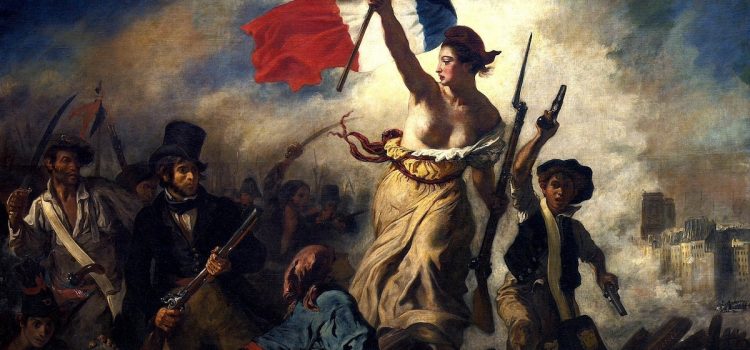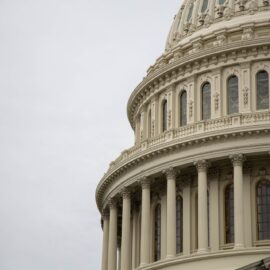

This article is an excerpt from the Shortform book guide to "Alexander Hamilton" by Ron Chernow. Shortform has the world's best summaries and analyses of books you should be reading.
Like this article? Sign up for a free trial here.
What was America’s role in the French Revolution? Why were American parties split on helping the French?
According to Ron Chernow’s book Alexander Hamilton, the French Revolution was a tough time for America. The Federalists wanted to side with the British for economic reasons, whereas the Republicans advocated for helping the French for democratic reasons.
Let’s look at the impact of the French Revolution on America.
Friendship With Britain Versus With France
France’s democratic revolution in 1789 and subsequent war with much of Europe, including Britain, would become a flashpoint in the struggle between Federalists and Republicans in America. The French Revolution riled up the two parties as they disagreed about whether to maintain neutrality in the conflict and which country—Britain or France—could prove to be a better ally to the US in the coming decades. Though both Jefferson and Hamilton had left office by 1794, they continued to exert influence in Congress and the cabinet of the US’s second president, the Federalist John Adams.
The Federalists favored a renewed friendship with Britain, seeing it as a more stable and economically valuable partner. Hamilton in particular advocated for increased trade between the US and Britain. By contrast, Republicans saw the French Revolution as the ideological companion to the American Revolution, fought against a monarchy on the same principles of democracy and freedom. Jefferson and others also argued that the US owed France for its assistance during the Revolutionary War.
Too Much Government Versus Too Much Democracy
Chernow argues that the French Revolution and its violent aftermath embodied some of Hamilton’s worst fears about the future of the US—namely, that a justified democratic revolt against a monarchy would devolve into chaos and mob rule. Looking at Hamilton’s writings, Chernow observes that he repeatedly expressed concern that a weak central government and “too much democracy” would lead to anarchy. The 1793 Reign of Terror in France, in which thousands of supposed traitors and former elites were imprisoned or publicly executed (including the French royal family), was interpreted by many Federalists as just that.
Republicans like Jefferson, a known Francophile who’d lived in Paris for years during the Revolutionary War, tended to use more idealistic and populist rhetoric, championing the rights of the common man and decrying “too much government” as a slippery slope toward authoritarianism. While Federalists condemned the Terror, Republicans largely dismissed the reports of violence as propaganda and expressed solidarity with the revolutionaries.
(Shortform note: Historians have waged a long and contentious debate over responsibility for the Terror and its scope. Those who blame Maximilien Robespierre, a revolutionary leader, generally argue that the Terror began in early 1793 and ended with his execution in the summer of 1794, but others claim that the killings began as early as 1792 and went on well into 1795. The number of people killed has been suggested to be as low as two thousand or as high as fifty thousand. Scholars also disagree on whether the violence was inevitable or a gradual perversion of what began as a noble democratic movement.)
When war between France and Britain broke out in 1793, the question of how the US should respond was complicated by the fact that the executed King Louis XVI had supported the American Revolution, and several important revolutionary allies, such as the Marquis de Lafayette, fled France in fear for their lives during the Terror. The Washington and Adams administrations both recognized the new French government and exchanged diplomats, but they attempted to remain neutral otherwise, which would become progressively more difficult through the end of the decade.
(Shortform note: Ironically, the support King Louis XVI and Lafayette gave to the American Revolution contributed to their downfall during the French Revolution. France’s participation in that war left its government nearly bankrupt during a period of repeated food shortages, adding to Louis XVI’s unpopularity, and Lafayette’s military service led to him being named captain of the Paris National Guard, which he would then order into the Champ de Mars massacre. Louis XVI was guillotined in 1793, and Lafayette escaped to present-day Belgium, only for the Austrian government to imprison him as a potentially dangerous revolutionary. The US government was unable to negotiate his release, though it did send him money for several years.)
The Practicalities of American Involvement
A large part of Hamilton’s support for Britain over France was motivated by the fact that Britain would be a more valuable trading partner, providing everyday goods to the US while France generally exported only luxuries. An alliance could also open up trade between the US and the Caribbean, where Britain still owned several colonies, and ensure the safety of US ships in the Atlantic—at this time, the British navy was the most powerful in the world. Entering into a war with Britain would, in Hamilton and Chernow’s view, prove disastrous for the US’s economy and internal stability. The eventual position of the Adams administration, supported by Hamilton, was to maintain neutrality.
(Shortform note: Though US-British relations would remain turbulent throughout the 19th century, particularly as Britain maintained neutrality during the American Civil War, since World War II the two countries have been close political and economic allies. Today, the US is Britain’s biggest export market, and the two countries are each other’s largest direct investors.)
The neutrality approach met with several roadblocks. Once Britain joined the war against France in 1793, it began illegally capturing American ships and sailors and conscripting them into the fight. Chief Justice John Jay signed a treaty with Britain on behalf of the US in 1794 that brought an end to this practice, but the treaty was viewed by much of the public as unfairly biased—Britain did not promise to return the captured ships, and while the US granted Britain most-favored-nation status in trade, it didn’t receive the same privileges in return. Chernow notes that many Americans opposed any kind of agreement with Britain, still seeing them as the enemy of the Revolutionary War.
(Shortform note: Historically, most-favored-nation (MFN) status referred to one nation giving another certain advantages in trade, such as the receiving nation having to pay lower tariffs or being able to import and export greater quantities of goods to and from the giving nation. In the modern day, all member nations of the World Trade Organization give MFN status to each other, ensuring equal benefits for participating in the WTO. Member nations may vote to strip other nations of their MFN status as a form of political pressure.)
In response to American neutrality, US-France relations steadily deteriorated throughout the 1790s. Under the reign of Napoleon Bonaparte, France began capturing American ships, trade between the two nations was embargoed, and the US paused repaying its loans from the Revolutionary War. However, by 1800 these tensions had relaxed, and by the end of the European war in 1803 the relationship between the US and France was strong enough to facilitate the Louisiana Purchase; a massive sale of land in North America to the US.
(Shortform note: The peace surrounding the Louisiana Purchase would prove temporary, as the Napoleonic Wars between France and much of Europe began later in 1803 and continued on and off until 1815. While the US maintained neutrality, Britain once again seized American ships and sailors, which became one of several factors leading the US to declare war on Britain in 1812. The War of 1812 ultimately ended with a truce, while the Napoleonic Wars ended with the defeat of Napoleon Bonaparte and the temporary restoration of the French monarchy.)

———End of Preview———
Like what you just read? Read the rest of the world's best book summary and analysis of Ron Chernow's "Alexander Hamilton" at Shortform.
Here's what you'll find in our full Alexander Hamilton summary:
- The biography of Alexander Hamilton that was adapted into the Broadway musical
- The life and influence of the overlooked Founding Father
- How Hamilton's life ended in scandal and a fatal duel






